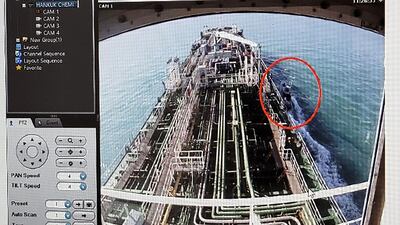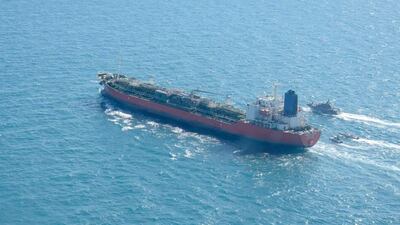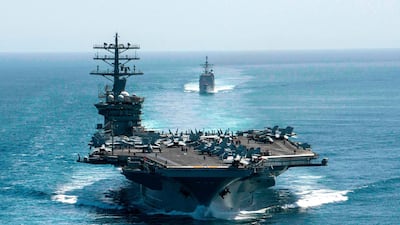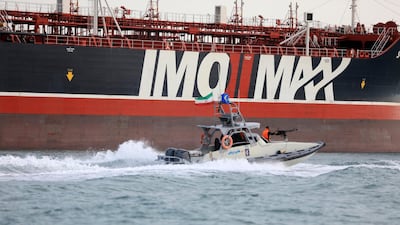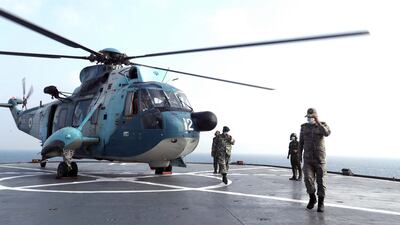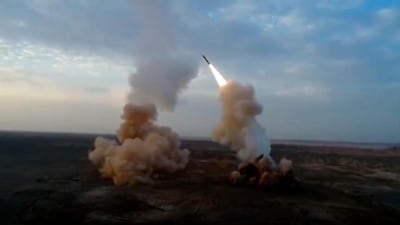South Korea's foreign ministry is reviewing whether a senior diplomat would be visiting Tehran on Sunday as planned after Iranian forces seized a South Korean-flagged chemical tanker in Gulf waters and detained its crew, an official said.
The incident comes amid tensions between Tehran and Seoul over Iranian funds frozen in South Korean banks because of US sanctions. Iranian state TV quoted a Tehran government official as saying Vice Foreign Minister Choi Jong-kun had been due to discuss Iran's demand that $7 billion in frozen funds be released.
In Seoul, a foreign ministry official told Reuters "the plan is unclear as of now" regarding Choi's visit.
Iranian media said on Monday that the Islamic Revolutionary Guard Corps had seized the tanker Hankuk Chemi over pollution violations. The vessel was carrying 7,200 tonnes of ethanol.
South Korea's foreign minister Kang Kyung-wha said on Tuesday diplomatic efforts were being made to secure the release of the tanker, Yonhap news agency reported.
Ms Kang told reporters that she had first responded to her counterparts in Iran on Monday and the ministry is now in talks with diplomats in Tehran and in Seoul to resolve the issue.
"We have been trying to figure out what happened through the Iranian Embassy in South Korea and the South Korean Embassy in Iran and continuing to make efforts to address this situation," Ms Kang told South Korean press agency Yongkip.
Iranian state television quoted Saeed Khatibzadeh, a Foreign Ministry spokesman, as saying the ship had been seized for "polluting the sea".
Last Sunday, the Tehran Times newspaper reported Iran was hoping to negotiate an agreement to use the frozen funds to "barter" for coronavirus vaccine doses and other commodities.
The South Korean foreign ministry did not immediately comment on the report.
Asked about Iran's intentions for the frozen assets, Ms Kang said the safety of the ship's crew was more important, Yonhap said.
Relations hit new low
In the past decade, South Korea has largely complied with US sanctions on Iran, easing them during the so-called "nuclear deal" between 2016 and 2018, when trade restrictions were relaxed in exchange for UN inspections of Iran's nuclear sites. During that period, South Korean imports of Iranian oil rose.
But as President Donald Trump's administration began the "maximum pressure" campaign to reinstate highly restrictive sanctions on Tehran, South Korea cut imports of Iranian oil and condensate, a hydrocarbon liquid used in the South Korean refining industry.
The Woori Bank and Industrial Bank of Korea then froze Iranian funds in September 2019, when a US waiver for South Korea to continue importing Iranian oil expired.
Iranian Foreign Ministry spokesman Seyed Abbas Mousavi had previously said that Iran would take legal action to release the funds, calling South Korea a "servant" of the US.
The US State Department responded to Iran's actions, condemning them as "a clear attempt to extort the international community into relieving the pressure of sanctions”.
The seizure of the boat on Monday by naval forces of the Islamic Revolutionary Guard Corps will therefore be seen by many as an extremely self-defeating move, undermining Mr Mousavi's legal claim.
Koh Kyung-sok, who heads the South Korean Foreign Ministry's division for African and Middle Eastern affairs, said Mr Mousavi's comments were "inappropriate".
In remarks to the Yonhap news agency, South Korean Foreign Ministry spokesperson Kim In-chul said that the ministry had "expressed regret" over Iran's remarks on the crisis.
